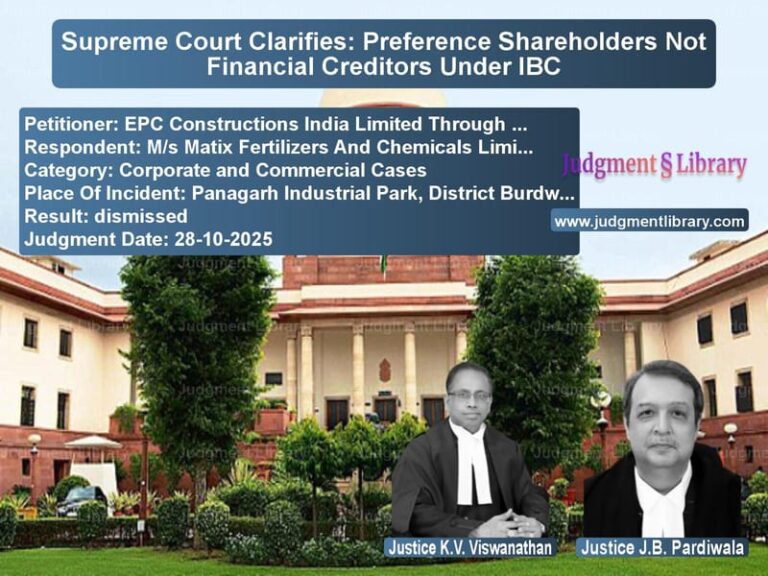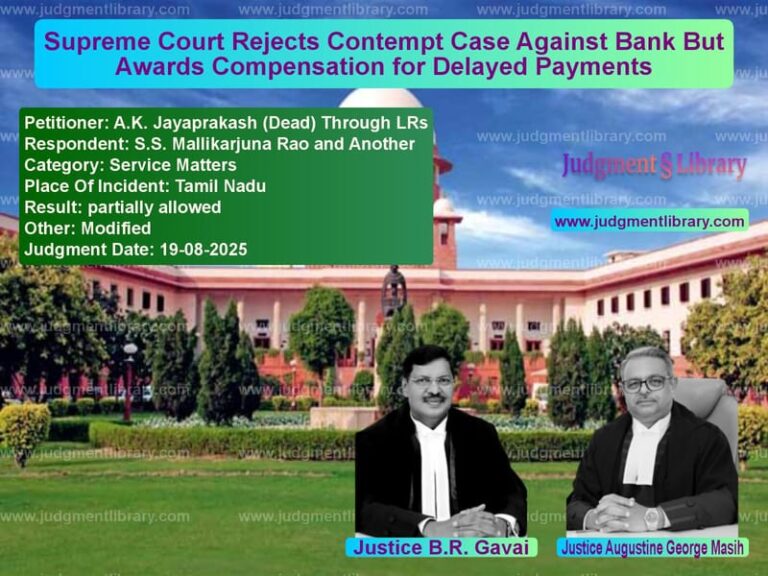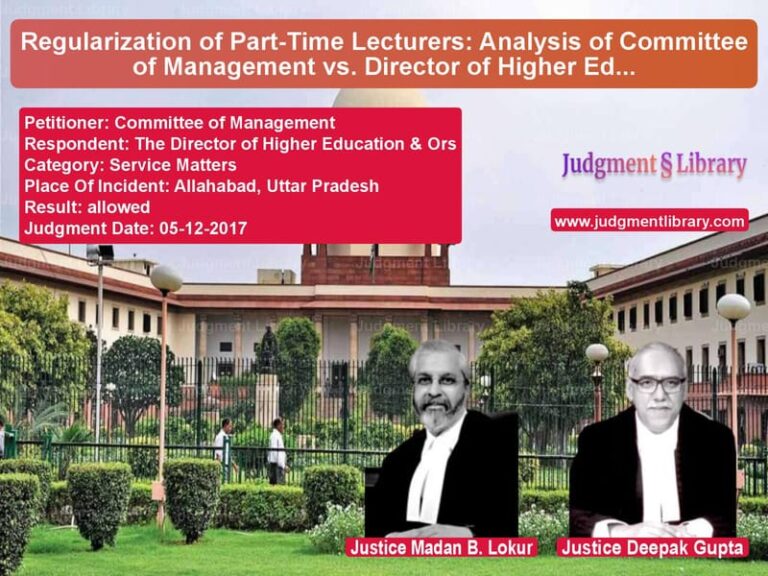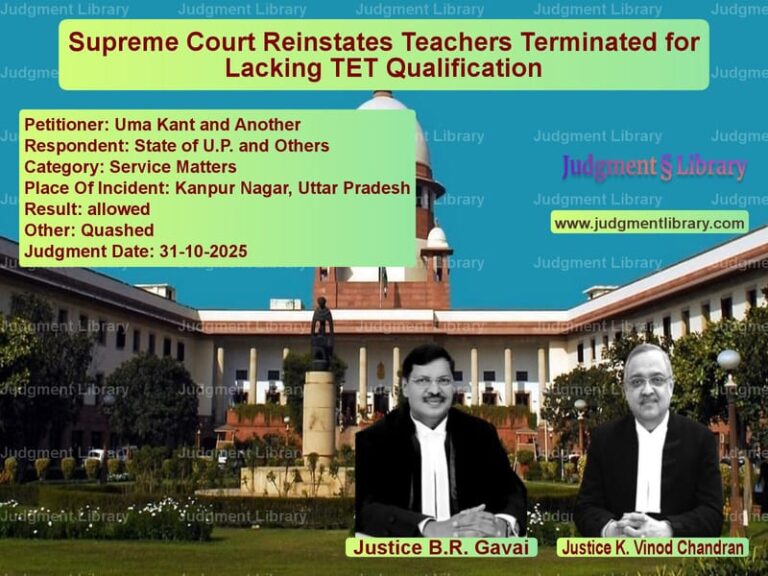Cheque Bounce Case: Supreme Court’s Ruling on Concurrent Sentencing
The case of Shyam Pal vs. Dayawati Besoya & Anr. is a significant judgment concerning the interpretation of Section 138 of the Negotiable Instruments Act, 1881, particularly in relation to sentencing in cheque bounce cases. The Supreme Court ruled on whether sentences in multiple cases arising from the same transaction should run concurrently or consecutively. The Court exercised its discretion under Section 427 of the Code of Criminal Procedure (CrPC) to allow concurrent sentences.
Background of the Case
The dispute began when the respondent, Dayawati Besoya, filed two complaints under Section 138 of the Negotiable Instruments Act (NI Act) against the appellant, Shyam Pal. The complaints were filed in the Court of the Chief Metropolitan Magistrate, Patiala House, New Delhi, and registered as C.C. No. 407 of 2011 and C.C. No. 430 of 2011.
The respondent alleged that the appellant had borrowed two loans of Rs.5 lakh each, issuing two post-dated cheques in repayment. However, both cheques were dishonored due to insufficient funds. Despite legal notices, the appellant failed to repay the amount, leading to criminal proceedings.
Legal Journey
- The Trial Court convicted the appellant under Section 138 of the NI Act and sentenced him to 10 months of simple imprisonment in each case, along with a fine of Rs.6,50,000/- as compensation per case. In case of default, he was to undergo additional six months of simple imprisonment.
- The appellant challenged the conviction in the District and Sessions Court, Saket, New Delhi, but his appeal was dismissed.
- He then filed a Criminal Revision Petition before the Delhi High Court, which upheld his conviction. However, the High Court reduced the default sentence from six months to three months in each case.
- After serving a substantial period of his sentence, the appellant filed a petition in the Supreme Court, arguing that the sentences should run concurrently rather than consecutively.
Arguments by the Parties
Appellant’s Arguments (Shyam Pal)
- The two cases arose from successive transactions between the same parties and should be treated as a single transaction.
- Since both cases were tried together and the evidence was identical, the sentences should run concurrently.
- He had already served a considerable period in custody and came from a poor financial background, making consecutive sentences unjust.
Respondent’s Arguments (Dayawati Besoya & Anr.)
- The two cases involved separate loans, separate cheques, and separate dishonor transactions.
- The appellant failed to make any payment despite multiple opportunities, warranting strict punishment.
- Granting concurrent sentences would dilute the deterrent effect of Section 138 of the NI Act.
Supreme Court’s Observations
The Supreme Court considered the applicability of Section 427 of CrPC, which states:
“When a person already undergoing a sentence of imprisonment is sentenced on a subsequent conviction to imprisonment or imprisonment for life, such imprisonment shall commence at the expiration of the imprisonment to which he has been previously sentenced, unless the Court directs that the subsequent sentence shall run concurrently.”
The Court cited precedents such as V.K. Bansal vs. State of Haryana (2013), where it was held that concurrent sentencing is permissible in cases arising from the same transaction.
Final Judgment
The Supreme Court ruled in favor of the appellant and ordered:
- The substantive sentences of 10 months each in both cases would run concurrently.
- The appellant would still need to serve the default sentence in case of non-payment of fines.
- The appellant was entitled to relief regarding his release based on this ruling.
Impact of the Judgment
For Convicts in Cheque Bounce Cases
- Convicts can seek concurrent sentencing in cases where multiple complaints arise from a single transaction.
- The ruling provides relief to financially strained individuals serving multiple sentences for similar offenses.
For Courts and Legal Practitioners
- Courts must assess whether multiple offenses arise from a single transaction before deciding on concurrent or consecutive sentencing.
- Lawyers can use this precedent to argue for reduced sentences in similar cases.
Conclusion
The Supreme Court’s ruling in Shyam Pal vs. Dayawati Besoya provides clarity on concurrent sentencing in cheque bounce cases. By balancing justice and deterrence, the judgment ensures fair application of the law while preventing excessive punishment for financially struggling individuals.
Don’t miss out on the full details! Download the complete judgment in PDF format below and gain valuable insights instantly!
Download Judgment: Shyam Pal vs Dayawati Besoya & An Supreme Court of India Judgment Dated 28-10-2016.pdf
Direct Downlaod Judgment: Direct downlaod this Judgment
See all petitions in Fraud and Forgery
See all petitions in Cheque Dishonour Cases
See all petitions in Debt Recovery
See all petitions in Judgment by Dipak Misra
See all petitions in Judgment by Amitava Roy
See all petitions in partially allowed
See all petitions in Modified
See all petitions in supreme court of India judgments October 2016
See all petitions in 2016 judgments
See all posts in Criminal Cases Category
See all allowed petitions in Criminal Cases Category
See all Dismissed petitions in Criminal Cases Category
See all partially allowed petitions in Criminal Cases Category







